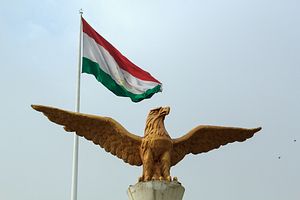Last Friday the U.S. State Department’s spokesperson, John Kirby, began the daily press briefing with a note regarding the department’s annual designation of “countries of particular concern.” The U.S. Commission on International Religious Freedom (USCIRF), an independent commission, each year makes recommendations to the State Department regarding countries that routinely violate religious freedoms. Kirby said that this year State would re-designate Burma (Myanmar), China, Eritrea, Iran, North Korea, Sudan, Saudi Arabia, Turkmenistan, and Uzbekistan; and would “for the first time [designate] Tajikistan as a Country of Particular Concern.”
Tajikistan has been recommended for designation by USCIRF since 2012 but State has, until this year, avoided making the designation. This is seen as important because the label as a “country of particular concern” carries with it the possibility of sanctions, though State has waived using that lever on the countries of Central Asia (and also Saudi Arabia) “following determinations that the important national interest of the United States required exercising this waiver authority.”
This exchange from the press briefing says it all:
QUESTION: Let’s start with the religious freedom designations. So you waived sanctions on Saudi and the ‘Stans, right? Is that basically it?
MR KIRBY: Basically.
It’s report season and while USCIRF’s 2016 report has not been released yet, but we can guess what it’ll say. Within the context of broader regional–even global–reflections on 2015, Tajikistan’s stands out for its rapid decline on several fronts.
This week Reporters Sans Frontieres (RSF) released its annual report, the 2016 world press freedom index. Following shortly after Freedom House’s Nations in Transit report and the U.S. State Department’s country reports on human rights practices, the RSF report and rankings further underline that Tajikistan’s decline–in terms of shrinking political, civil society, and media spaces–is not only stark when compared to its neighbors, but nearly unique in the world.
In each report, Central Asia fares badly, in broad terms. Countries like Uzbekistan and Turkmenistan sit on the bottom of the rankings accompanying these various reports and Kazakhstan has exhibited a distinct stagnation just above the bottom. Kyrgyzstan–parliamentarians from which recently expressed frustration at criticisms of the country’s human rights record–remains nonetheless in a tier above the rest of the region.
But Tajikistan’s decline has been the most rapid.
In the RSF report, for example, Tajikistan stumbled from 116 (out of 180) to 150th, a fall of 34 places. The only other country to tumble so far was Brunei, which has successfully implemented blasphemy laws that have ushered in an era of self-censorship. Tajikistan’s fall, per the RSF report, is rooted in the state’s singular response to virtually all economic and security threats: “tightening the screw.”
“President Emomali Rahmon used ‘counter-terrorism’ as grounds for gagging critics and consolidating his personal power, and in so doing jeopardized the fragile national consensus,” RSF argued.
This “fragile national consensus” alluded to is the 1997 peace accords that ended the Tajik civil war. In part, the agreement was built on the mandated inclusion of the opposition into the government. Over the years Rahmon has gradually maneuvered members of the former opposition out of government–dismantling the peace accord stipulations from within. This campaign intensified in 2015, as I outlined in an article in December appropriately titled “Tajikistan’s Terrible, Horrible, No Good, Very Bad Year.”
But what’s next? These rankings–no matter how robust their methodologies might be–are simply lists of numbers. And given the repeated waiving of sanctions on Turkmenistan and Uzbekistan, and now Tajikistan, it’s unclear that the United States, the EU, or any other Western democracy is aiming to fundamentally recalibrate its relationships with Central Asia’s autocrats.

































